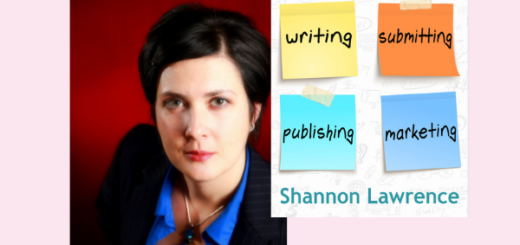Writing Short Stories Can Make Your Novel Better by Thao Nguyen
 Let’s welcome back monthly columnist Thao Nguyen as she shares with us “Writing Short Stories Can Make Your Novel Better.” Enjoy!
Let’s welcome back monthly columnist Thao Nguyen as she shares with us “Writing Short Stories Can Make Your Novel Better.” Enjoy!
***
Writing a book is a big commitment.
It often involves plenty of planning and months of writing. If you don’t think you’re ready for that yet, then short stories provide the perfect medium to practice in.
It’s often pointed out that writing a short story and writing a novel are two very different things, not the least because one can take several hours to draft while the other can take years to complete.
Many people warn that the techniques used to make a short story intriguing and powerful might not work so well in a longer context. While this has some truth to it, writing plenty of stories, no matter how short, can ultimately help you hone your skills as an author.
Here’s how:
Short Stories Grow Your Author Voice
“Practice makes perfect,” the old adage goes—and it’s not wrong.
You can search for inspiration from literary giants and up-and-coming authors all you want, but you will only accomplish an elegant command of language if you practice using it yourself.
Which is why writing short stories is the perfect way to experiment with and practice your voice.
Without the pressure of chipping away at a long-term goal inherent in novel-writing, short stories give you the headspace to actually test out different styles. And since they’re faster to write, you can quite quickly complete one story and then test out a new style with another.
It’ll be like trying on different coats to see which one suits you the best, and once you’ve found a voice that serves you, you can focus on honing it.
Another trick I sometimes do to see how my voice has developed (and what I like or dislike about it) is to rewrite a short story I drafted a while back from memory, then compare the two versions.
Through this, I often notice good changes as well as forgotten techniques, both of which make me more mindful when I’m writing new pieces. And seeing how far you’ve come can be an encouragement to keep writing, too!
Short Stories as Character Development Exercises
Short stories are like a cross section of a bigger story—it’s a slice into the life of the main character.
And as I mentioned above, since the format is so precise, you as the writer can really ponder every movement and analyze every change in the character’s emotions and decisions. This makes the short story an effective way for you to really focus on the character and get to know them more.
It’s like a case study into a specific character.
There are various character development exercises that can act as short story prompts for you to creatively explore in the nooks and crannies of your character’s mind. (You can even use a character’s name as your jumping off point, by picking something that’s meaningful or intriguing.)
If you’ve only sketched a skeleton for your character and you’re unsure where to go next, short stories will be a chance for you to get to know the person more by running them through a couple of scenarios.
You can use these prompts while you’re writing a novel, especially when you’re stuck in a writing rut.
Here’s a good one: Put your character in a new setting and discover their personality by writing an unexpected short story.
This kind of story doesn’t have to be perfect. You’ll learn that in the process of setting it up and teasing out the details of your short plot. The important part is to reacquaint yourself with the character and perhaps see them in a new light.
Who knows, the story might end up being so good that you include it in your book manuscript after all!
The Word Limit Makes You a Better Writer and Editor
If you love reading short stories, you’ll know that they may be small but they can be mighty.
Most stories fall in the range of 3,000 to 7,000 words, yet they can open up doors into all kinds of lives and personalities. Every line of a short story is written with consideration so that it adds something to the story. This skill has a lot to offer to the process of writing and editing a novel.
A good story is one that deftly unpacks a topic.
From the moment the story begins, you should already be asking yourself whether this is the most effective way to unravel that topic. And then as you keep writing, you need to be mindful that every sentence is another step forward in the plot.
You have to be a bit ruthless with what you choose to include in or exclude from your short story. And within every sentence, you’ll often have to consider whether a word or phrase is the most effective way to capture a scene or feeling.
Of course, there’s a lot more room to wriggle in a novel. However, a good story of any kind will still give you that feeling as if not a single word was wasted, and everything was planted so that readers would reach the end feeling immersed and satisfied.
Indeed, with a story as long as a novel, the care you put into placing certain details in the right place to lead up to a revelation is arguably even more important than in a short story. So getting in the practice of being intentional with your story will be invaluable when you write a novel.
Similarly, that efficient, detail-oriented mindset will also be a great asset to you when you revise your novel, especially when you’re doing a structural edit.
Structural edits (or developmental edits) involve looking at the plot and its themes, and asking yourself constantly: Do I need this detail here? Does the story flow smoothly and build up to the climax effectively?
You can get plenty of practice noticing these big picture things when you write and edit short stories, thus making it more manageable when you move onto a bigger project like book writing.
Now Write!
So while writing short stories and writing novels certainly aren’t the same things, the former definitely equips you with some invaluable skills for when you get to attempting the latter.
Rome wasn’t built in a day, and neither is a great storyteller—just keep those tales coming, and I trust I’ll be seeing your book on a shelf one day!
***
Want to read more articles like this one Writer’s Fun Zone? Subscribe here.
***
ABOUT THE AUTHOR
 Thao Nguyen writes about history, diasporic experiences, and writing. You can find her work in Literally Stories, Anak Sastra, or on Twitter @thao__to
Thao Nguyen writes about history, diasporic experiences, and writing. You can find her work in Literally Stories, Anak Sastra, or on Twitter @thao__to






